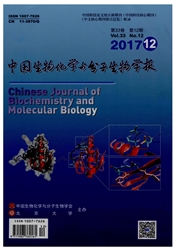

 中文摘要:
中文摘要:
目前已经鉴定出17种类泛素蛋白(ubiquitin-like proteins,UBLs),这些蛋白与底物的结合方式与泛素相似.根据进化特征,可将UBLs分为9类,分别为:NEDD8、SUMO、ISG15、FUB1、FAT10、Atg8、Atg12、Urm1和UFM1.NEDD8是目前研究最多的UBLs之一,与泛素的氨基酸序列具有高度相似性.NEDD化修饰是一种动态的可逆蛋白质翻译后修饰方式,可以将NEDD8共价结合到靶蛋白之上,也可以将NEDD8从靶蛋白上去除.NEDD化修饰对蛋白功能具有重要的调节作用,如改变蛋白质的空间构象、阻碍底物与其它蛋白质的相互作用和招募与NEDD8相互作用的蛋白等.最新研究表明,NEDD化与肿瘤的发生发展密切相关,但具体的机制还不清楚.本文将就NEDD化修饰在肿瘤发展过程中的作用机制做一综述.
 英文摘要:
英文摘要:
Currently, 17 ubiquitin-like proteins (UBLs) have been identified to modify substrates like what the ubiquitin does. UBLs are divided into 9 distinct classes based on the evolutional features, including NEDD8, SUMO, ISG15, FUB1, FAT10, Atg8, Atgl2, Urml, and UFM1. NEDD8 shares the highest amino acid sequence similarity with ubiquitin and is best characterized. Neddylation is a dynamic and reversible post-translational modification, involving covalently binding of NEDD8 to target proteins, or reversiblely, the remove of NEDD8 from modified target proteins. Neddylation plays important roles in the regulation of protein functions, such as conformation change, partner recruitiment and modulation of protein interaction. Recent studies revealed that aberration of neddylation and NEDD8-interacting proteins was significant during tumorigenesis. This review focuses on potential implications of neddylation for the development mechanism of tumor.
 同期刊论文项目
同期刊论文项目
 同项目期刊论文
同项目期刊论文
 PTEN suppresses the oncogenic function of AIB1 through decreasing its protein stability via mechanis
PTEN suppresses the oncogenic function of AIB1 through decreasing its protein stability via mechanis FOXK2 Transcription Factor Suppresses ER alpha-positive Breast Cancer Cell Growth Through Down-Regul
FOXK2 Transcription Factor Suppresses ER alpha-positive Breast Cancer Cell Growth Through Down-Regul EGF is required for cardiac differentiation of P19CL6 cells through interaction with GATA-4 in a tim
EGF is required for cardiac differentiation of P19CL6 cells through interaction with GATA-4 in a tim Induction of the CLOCK gene by E2-ERalpha signaling promotes the proliferation of breast cancer cell
Induction of the CLOCK gene by E2-ERalpha signaling promotes the proliferation of breast cancer cell DEC1 regulates breast cancer cell proliferation by stabilizing cyclin E protein and delays the progr
DEC1 regulates breast cancer cell proliferation by stabilizing cyclin E protein and delays the progr Switching of the Triplet Excited State of Rhodamine/Naphthaleneimide Dyads: An Experimental and Theo
Switching of the Triplet Excited State of Rhodamine/Naphthaleneimide Dyads: An Experimental and Theo The relationship between the inflammatory response and cell adhesion on alginate-chitosan-alginate m
The relationship between the inflammatory response and cell adhesion on alginate-chitosan-alginate m Contributory role of five common polymorphisms of RAGE and APE1 genes in lung cancer among Han Chine
Contributory role of five common polymorphisms of RAGE and APE1 genes in lung cancer among Han Chine DACH1 inhibits SNAI1-mediated epithelial-mesenchymal transition and represses breast carcinoma metas
DACH1 inhibits SNAI1-mediated epithelial-mesenchymal transition and represses breast carcinoma metas 期刊信息
期刊信息
